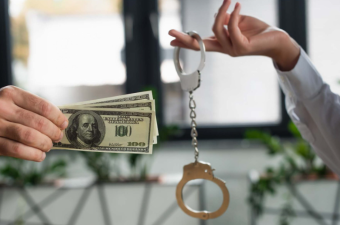Bail refers to the money that the accused pays to the judicial authority with the consent of the judicial authority in order to obtain pre-trial release to ensure that he appears in court on time for trial and abides by the conditions set by the court during the release period.
Bail refers to the money that the accused pays to the judicial authority with the consent of the judicial authority in order to obtain pre-trial release to ensure that he appears in court on time for trial and abides by the conditions set by the court during the release period.
As early as the period of procedural litigation in ancient Rome, in order to ensure that the defendant appears in court on time, the court may require the defendant to provide certain guarantees. If the defendant violates the obligation to appear in court, the plaintiff can ask the judge to make a "possession order" to allow him to possess the defendant's property and auction it if necessary. This is the initial embryo of the bail system. There are records of the bail system in the Anglo-Saxon period in the United Kingdom around the 6th century. The cash bail system has a history of more than 100 years in the United States. The court will evaluate the situation and then set a certain amount of bail to ensure that the defendant who is released early will come to attend the trial. In 2018, California, the United States, passed a bill to abolish the bail system and replace it with a risk assessment algorithm tool to replace the cash bail system.

American system
The laws related to bail in the United States are derived from British common law. The original model was that when someone was arrested for a crime, if someone in his community guaranteed that he would appear in court on time, the person could be released and wait for trial outside the prison. If he escaped, the guarantor would bear the punishment. Later, this practice of guaranteeing a person's life and freedom was replaced by the practice of using property as collateral. Today, monetary guarantees have become a major form of the bail system.
The bail system in the United States stipulates that after a person is arrested and charged with a crime, the court will propose that the defendant must pay a certain amount of bail to be released on bail, and he can wait for trial at home. In addition to paying the full bail stipulated by the court in cash, checks and credit cards, the states in the United States have also adopted commercial bail and court fee systems, so that many suspects only need to pay 10% of the bail amount to obtain bail.
Commercial bail:
The defendant can hire a bail bond broker and pay 10% of the bail as the other party's reward. After that, the bail bond broker will submit a guarantee to the court, but he must ensure that the defendant will definitely appear in court for trial. Once the defendant fails to appear in court or is arrested for another crime during the bail period, the bail bond broker will have to pay the full bail himself, and the defendant will be put back in jail. The court will then propose a new bail based on the charges.
Court fee system:
eligible suspects can obtain bail by paying cash equivalent to 10% of the bail amount. If they appear in court on time, the court will deduct 10% of the paid amount (that is, 1% of the total bail amount) as management fees, and return the rest to the suspect. If the suspect fails to appear in court on time, the court will confiscate all the paid amounts and notify the suspect to appear in court within 30 days. If the suspect still does not appear in court, he will need to pay full bail.
The commercial bail system and the court fee system each have their advantages. Theoretically, if the government acts as a bail bond broker, government officials will not enrich themselves by engaging in this business. However, if the defendant does not appear in court for trial, it is more effective to let the bail bond broker take responsibility.
Surveys show that if there is no material incentive, the rate of defendants evading trial will increase significantly. In Oregon, for example, one in three defendants fails to appear in court, but in states with commercial bail systems, the rate is much lower.
